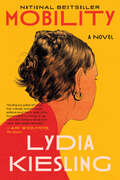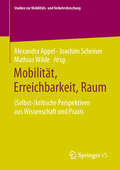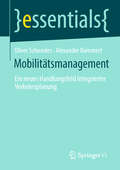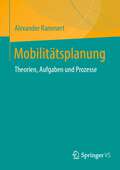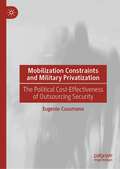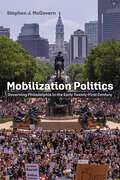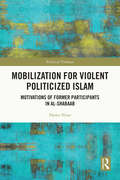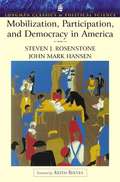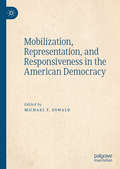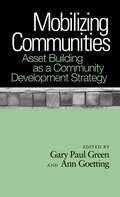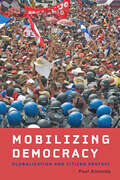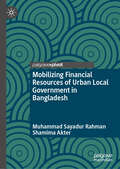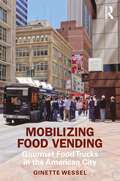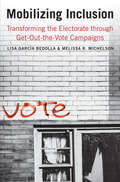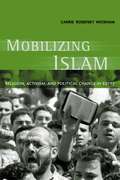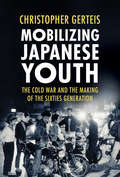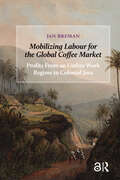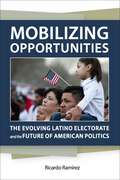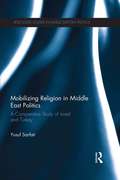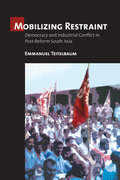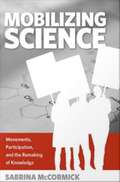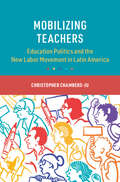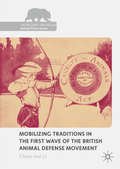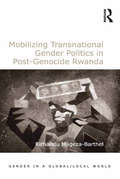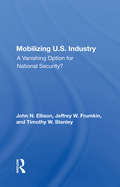- Table View
- List View
Mobility: A Novel
by Lydia KieslingNational Bestseller Longlisted for the 2024 Joyce Carol Oates PrizeA Powell&’s Best Book of 2023A TIME Best Book of 2023A Vulture Best Book of 2023&“A masterpiece of misdirection.&” ―Geraldine Brooks&“Mobility is a truly gripping coming-of-age story about navigating a world of corporate greed that&’s both laugh-out-loud funny and politically incisive.&” ―Jon Favreau, Jon Lovett, and Tommy Vietor&“Kiesling . . . has pulled off a rare feat: a deeply serious, deeply political novel that is, quite often, fun to read. It&’s a coming-of-age story full of delicious detail, keen satire, and complex humanity.&” ―Amy Weiss-Meyer, The AtlanticBunny Glenn believes in climate change. But she also likes to get paid.The year is 1998. The Soviet Union is dissolved, the Cold War is over, and Bunny Glenn is a lonely American teenager in Azerbaijan with her Foreign Service family. Through Bunny&’s bemused eyes, we watch global interests flock to her temporary backyard for Caspian oil and pipeline access, hearing rumbles of the expansion of the American security state and the buildup to the War on Terror. We follow Bunny from adolescence to middle age―from Baku to Athens to Houston―as her own ambition and desire for comfort lead her to a career in the oil industry, eventually returning to the scene of her youth, where slippery figures from the past reappear in an era of political and climate breakdown.Propulsive and thought-provoking, empathetic yet pointed, Mobility is a story about class, power, politics, and desire told through the life of one woman―her social milieu, her romances, her unarticulated wants. Through Bunny&’s life choices, Lydia Kiesling masterfully explores American forms of complicity and inertia, moving between the local and the global, the personal and the political, and using fiction&’s singular power to illuminate a life shaped by its context.
Mobilität, Erreichbarkeit, Raum: (Selbst-)kritische Perspektiven aus Wissenschaft und Praxis (Studien zur Mobilitäts- und Verkehrsforschung)
by Joachim Scheiner Mathias Wilde Alexandra AppelDer Sammelband fasst wichtige Themen und Entwicklungen der Mobilitäts- und Verkehrsforschung der letzten Jahre zusammen. Die Beiträge gehen auf das Instrumentarium empirischer Forschung ein und erläutern deren Einsatzbereiche anhand konkreter Anwendungsfälle. Genauso zeigt der Sammelband jene Perspektiven auf, mit denen die Planungspraxis der (Um-)Gestaltung der Verkehrssysteme eine Form geben kann, um nachhaltigere Mobilität zu fördern. Damit richtet er sich sowohl an eine Leserschaft, die sich mit den wissenschaftlichen Grundlagen der Mobilitäts- und Verkehrsforschung befasst, als auch an eine Leserschaft, die an wissenschaftlich fundierten Maßnahmen zur nachhaltigen Umgestaltung der Verkehrssysteme interessiert ist.
Mobilitätsmanagement: Ein neues Handlungsfeld Integrierter Verkehrsplanung (essentials)
by Oliver Schwedes Alexander RammertDieses Essential zeigt die aktuelle Verkehrsentwicklung auf und leitet die zentralen Herausforderungen für eine integrierte Verkehrsplanung ab, die auf eine nachhaltige Verkehrsentwicklung gerichtet ist. Es wird gezeigt, dass neben technologischen Innovationen vor allem Veränderungen des Mobilitätsverhaltens notwendig sind, um die politisch angestrebten Nachhaltigkeitsziele im Verkehrssektor zu erreichen. Hierzu wird das neue Handlungsfeld des Mobilitätsmanagements eingeführt und aufgezeigt, über welche Möglichkeiten es verfügt, dass Mobilitätsverhalten der Menschen zu beeinflussen. Abschließend werden zum einen die verschiedenen Akteure und ihre Rolle bei der Planung von Mobilität vorgestellt, zum anderen die unterschiedlichen Maßnahmen, die dem Mobilitätsmanagement zur Verfügung stehen, detailliert aufgezeigt.
Mobilitätsplanung: Theorien, Aufgaben und Prozesse
by Alexander RammertDieses Buch umfasst die wesentlichen Grundlagen einer praxisorientierten Mobilitätsplanung. Im Gegensatz zur Verkehrsplanung fokussiert sich die Mobilitätsplanung auf den Menschen als zentrale Figur der Verkehrsentwicklung und entwirft daraus neue Perspektiven für die Planung. Mobilitätsplanung löst damit die Abhängigkeit vom technischen Artefakt des Verkehrs und zielt stattdessen darauf ab, direkt die Möglichkeiten der Menschen zu verstehen und zu beeinflussen. Das Buch richtet sich somit an alle Akteure, welche die Mobilität der Menschen in unterschiedlicher Weise beeinflussen. Klassischerweise gehören hierzu alle Ebenen der Planungspraxis, von Ministerien bis hin zu kommunalen Verwaltungen und Planungsbüros. Aber auch politisch Entscheidungstragende, Unternehmen und zivilgesellschaftliche Akteure gehören zu den Adressaten dieses Buches, da sie maßgeblich an der zukünftigen Entwicklung von Mobilität und Verkehr mitwirken.
Mobilization Constraints and Military Privatization: The Political Cost-Effectiveness of Outsourcing Security
by Eugenio CusumanoThis book investigates the connection between tightening mobilization constraints and the use of PMSCs in the United States, the United Kingdom, and Italy. Drawing on neoclassical realism and institutionalist theory, it conceptualizes democracies’ use of private military and security companies (PMSCs) as an attempt to circumvent the tightening constraints on the mobilization of military power. The use of private military contractors is less subjected to parliamentary restrictions and less visible to public opinion than the deployment of soldiers. Rather than cheaper in financial terms, PMSCs are therefore politically cost-effective, as they enable decision-makers to minimize the institutional obstacles on conducting military operations and the electoral costs attached thereto. The need to reduce the ex ante hurdles and the ex post costs of military deployments fills the blind spots of alternative explanations for the use of PMSCs based on effectiveness, ideology, and organizational interests.
Mobilization Politics: Governing Philadelphia in the Early Twenty-First Century
by Stephen J. McGovernHow grassroots activism transforms contemporary urban politics in Philadelphia and beyondImmigration, gentrification, and the rise of an innovation-based economy are altering American cities. In Mobilization Politics, Stephen J. McGovern offers a new approach to analyzing contemporary urban politics in light of these broad, societal changes. Redirecting the focus from the top-down orientation of regime theory toward a more bottom-up perspective, he contends that a striking upsurge in grassroots activism around issues such as policing and criminal justice reform, precarious labor, affordable housing, community development, and workforce diversity is transforming urban politics and policymaking.Through a detailed analysis of political activity in Philadelphia over the past decade, McGovern elucidates the mechanisms and impacts of grassroots mobilization. Philadelphia is typical of many large American cities with a relatively prosperous downtown core surrounded by neighborhoods that continue to struggle, sometimes amidst grinding poverty and long-standing racial oppression. And yet, Philadelphia, as a site of substantial grassroots activism since the early 2010s, has made significant strides in combatting economic and racial inequality in several important policy realms.Mobilization Politics expands the scope of the field of urban politics beyond the quiet, behind-the-scenes bargaining of regime partners and considers other key arenas of political contestation—such as electoral politics; policymaking by the mayor, administrative agencies, and the city council; and a wide range of activist groups operating at the grassroots. The book shows how bottom-up mobilization has been especially effective when activists engaging in street protests and demonstrations have joined with more established community-based organizations and issue-advocacy groups skilled in lobbying, litigation, and electioneering. By highlighting how this combination of insider/outsider activism has been a potent force for political change in contemporary Philadelphia, Mobilization Politics presents a more comprehensive, dynamic, and revealing way to look at power and politics in American cities today.
Mobilization for Violent Politicized Islam: Motivations of Former Participants in al-Shabaab (ISSN)
by Hawa NoorThis book focuses on the involvement of some Kenyans in al-Shabaab, an affiliate of Al-Qaeda based in Somalia, despite their country’s relative stability compared to Somalia.It discusses the origin of the Kenyan state and how colonization created social stratification that benefited elites closer to the center, while excluding marginalized groups at the periphery. The argument is that this pattern still prevails, despite attempts to enhance equality, such as the adoption of a new constitution in 2010 promoting the devolution of power and resources. The persistence of this condition, it is argued, is what initially handed al-Qaeda and later al-Shabaab opportunities for mobilization, enabled by its creative politicization of religion. The heavy-handed tactics employed by security forces under the auspices of the ‘War on Terror’ further catalyzed this process, resulting in more Kenyan individuals joining the group. Using an historical and political process approach, the book shows how the interplay of structural conditions and al-Shabaab’s mobilization strategy linked with individuals’ motivations for joining the group. Based on individuals’ own narratives about their participation, the latter is empirically demonstrated to be non-linear, incorporating motivations beyond rational ones, contrary to the overemphasis on ideology in the literature on participation in groups similar to al-Shabaab.This book will of much interest to students of political violence, African politics, Islamic studies and International Relations.
Mobilization, Participation, and Democracy in America
by Steven J. Rosenstone John Mark HansenMobilization, Participation, and Democracy in America provides a thorough analysis of the dynamics of citizen involvement in American politics over the past four decades and identifies who participates in the political process, when they participate, and why. Now in a Longman Classics Edition, it features a new Foreword by Keith Reeves of Swarthmore College.
Mobilization, Representation, and Responsiveness in the American Democracy
by Michael T. OswaldThis edited volume investigates America’s transforming democracy as it faces the challenges and developments of the 21st century—challenges and developments that have brought deep dissatisfaction, cultural fragmentation, and economic indignation. Although political power remains in the hands of the people, a fundamental incapability to compromise has locked policymakers in a permanent stalemate. In this legislative paralysis, grassroots movements build more and more momentum amidst regular protests and civil disobedience. This new political vigor and dynamism is dualistic, portending either a future of falsehoods and authoritarianism or a more empowering and direct form of democracy. This book ultimately seeks to understand how the US government is frantically adjusting to these sharp cultural, technological, and economic changes.
Mobilizing Communities: Asset Building as a Community Development Strategy
by Ann Green Gary Paul GoettingAs communities face new social and economic challenges as well as political changes, the responsibilities for social services, housing needs, and welfare programs are being placed at the local government level. But can community-based organizations address these concerns effectively? The editors and contributors toMobilizing Communitiesexplore how these organizations are responding to these challenges, and how asset-based development efforts can be successful. Asset-based development, rather than needs assessment, has become a new paradigm in the community development field over the last fifteen years. Although the approach is widely used by practitioners and promoted by foundations, asset-based development has not been examined critically by researchers until now. Mobilizing Communitiesprovides a conceptual framework and practical guidance to community development practitioners. The editors solicited case studies from a variety of geographic settings, regions and racial/ethnic groups. The communities in the case studies mobilize residents around different forms of community capital (e. g. , financial, cultural, and environmental capital). The contributors examine the role of public participation, the organizational and institutional structure, relationships with governmental officials, and the outcomes and impacts of the asset-based development projects. Contributors include: Lionel J. "Bo" Beaulieu, Sarah Dewees, Michael L. Dougherty, Mark H. Harvey, John (Jody) Kretzmann, Rocío Peralta, Rhonda Phillips, Deborah Puntenney, Stewart Sarkozy-Banoczy, Gordon E. Shockley, and the editors
Mobilizing Democracy: Globalization and Citizen Protest (Themes in Global Social Change)
by Paul AlmeidaWhat are the conditions and factors that drive people to protest against government economic policies in the developing world?Distinguished Scholarship Award of the Pacific Sociological Association (2015)Paul Almeida’s comparative study of the largest social movement campaigns that existed between 1980 and 2013 in every Central American country (Costa Rica, El Salvador, Guatemala, Honduras, Nicaragua, and Panama) provides a granular examination of the forces that spark mass mobilizations against state economic policy, whether those factors are electricity rate hikes or water and health care privatization. Many scholars have explained connections between global economic changes and local economic conditions, but most of the research has remained at the macro level. Mobilizing Democracy contributes to our knowledge about the protest groups "on the ground" and what makes some localities successful at mobilizing and others less successful. His work enhances our understanding of what ingredients contribute to effective protest movements as well as how multiple protagonists—labor unions, students, teachers, indigenous groups, nongovernmental organizations, women’s groups, environmental organizations, and oppositional political parties—coalesce to make protest more likely to win major concessions.Based on extensive field research, archival data of thousands of protest events, and interviews with dozens of Central American activists, Mobilizing Democracy brings the international consequences of privatization, trade liberalization, and welfare-state downsizing in the global South into focus and shows how persistent activism and network building are reactivated in these social movements. Almeida enables our comprehension of global and local politics and policy by answering the question, "If all politics is local, then how do the politics of globalization manifest themselves?" Detailed graphs and maps provide a synthesis of the quantitative and qualitative data in this important study. Written in clear, accessible prose, this book will be invaluable for students and scholars in the fields of political science, social movements, anthropology, Latin American studies, and labor studies.
Mobilizing Financial Resources of Urban Local Government in Bangladesh
by Muhammad Sayadur Rahman Shamima AkterThis book explains the dynamics of revenue generation and allocation reality of city corporations in Bangladesh. It explores the state of five consecutive years of revenue generation and expenditure allocations of Dhaka North City Corporation and Gazipur City Corporation along with a discussion of to what extent the City Corporation is allowed to enjoy fiscal autonomy through the Local Government (City Corporation) Act of 2009 to generate and manage its local resources. It also finds out the institutional blocks/challenges that the city corporation faces in the process of revenue generation and mobilization, even with the existence of a solid legislative foundation. Central to the book's focus is the resource mobilizing scenario (generation and allocation of revenue) of City Corporation over the past five consecutive years. It suggests some approaches that will serve as valuable resources for policymakers, researchers, and practitioners to take steps for strengthening the finance base of urban local government through revisiting and redefining revenue generation and allocation strategies.
Mobilizing Food Vending: Gourmet Food Trucks in the American City
by Ginette WesselMobilizing Food Vending investigates the gourmet food truck movement in the United States and provides a clearer understanding of the social and economic factors that shape vendor autonomy and industry growth. The book features case studies in a variety of American cities and uses top-down and bottom-up urban theory to frame a discussion of food trucks’ rights, displacement, and resiliency. Using ethnographic and archival research collected from industry experts, the book examines vendors’ operational strategies, their regulatory challenges when navigating the city, and their economic, cultural, and political roles in shaping urban space. Mobilizing Food Vending argues that food truck vendors are critical actors that support local economies and contribute to the public realm while shaping regulatory policy from the bottom up. This book will appeal to urban scholars studying the contemporary neoliberal city, the public realm, and communication technology and mobility, as well as to urban planners seeking to understand how vendors shape city plans and policies.
Mobilizing Inclusion: Transforming the Electorate through Get-Out-the-Vote Campaigns
by Lisa Garcia Bedolla Melissa R. MichelsonWhich get-out-the-vote efforts actually succeed in ethnoracial communities—and why? Analyzing the results from hundreds of original experiments, the authors of this book offer a persuasive new theory to explain why some methods work while others don’t. Exploring and comparing a wide variety of efforts targeting ethnoracial voters, Lisa García Bedolla and Melissa R. Michelson present a new theoretical frame—the Social Cognition Model of voting, based on an individual’s sense of civic identity—for understanding get-out-the-vote effectiveness. Their book will serve as a useful guide for political practitioners, for it offers concrete strategies to employ in developing future mobilization efforts.
Mobilizing Islam: Religion, Activism, and Political Change in Egypt
by Carrie Rosefsky WickhamMobilizing Islam explores how and why Islamic groups succeeded in galvanizing educated youth into politics under the shadow of Egypt's authoritarian state, offering important and surprising answers to a series of pressing questions. Under what conditions does mobilization by opposition groups become possible in authoritarian settings? Why did Islamist groups have more success attracting recruits and overcoming governmental restraints than their secular rivals? And finally, how can Islamist mobilization contribute to broader and more enduring forms of political change throughout the Muslim world? Moving beyond the simplistic accounts of "Islamic fundamentalism" offered by much of the Western media, Mobilizing Islam offers a balanced and persuasive explanation of the Islamic movement's dramatic growth in the world's largest Arab state.
Mobilizing Japanese Youth: The Cold War and the Making of the Sixties Generation (Studies of the Weatherhead East Asian Institute, Columbia University)
by Christopher GerteisIn Mobilizing Japanese Youth, Christopher Gerteis examines how non-state institutions in Japan—left-wing radicals and right-wing activists—attempted to mold the political consciousness of the nation's first postwar generation, which by the late 1960s were the demographic majority of voting-age adults. Gerteis argues that socially constructed aspects of class and gender preconfigured the forms of political rhetoric and social organization that both the far-right and far-left deployed to mobilize postwar, further exacerbating the levels of social and political alienation expressed by young blue- and pink- collar working men and women well into the 1970s, illustrated by high-profile acts of political violence committed by young Japanese in this era.As Gerteis shows, Japanese youth were profoundly influenced by a transnational flow of ideas and people that constituted a unique historical convergence of pan-Asianism, Mao-ism, black nationalism, anti-imperialism, anticommunism, neo-fascism, and ultra-nationalism. Mobilizing Japanese Youth carefully unpacks their formative experiences and the social, cultural, and political challenges to both the hegemonic culture and the authority of the Japanese state that engulfed them. The 1950s-style mass-mobilization efforts orchestrated by organized labor could not capture their political imagination in the way that more extreme ideologies could. By focusing on how far-right and far-left organizations attempted to reach-out to young radicals, especially those of working-class origins, this book offers a new understanding of successive waves of youth radicalism since 1960.
Mobilizing Labour for the Global Coffee Market: Profits From an Unfree Work Regime in Colonial Java (Social Histories of Work in Asia)
by Jan BremanCoffee has been grown on Java for the commercial market since the early eighteenth century, when the Dutch East India Company began buying from peasant producers in the Priangan highlands. What began as a commercial transaction, however, soon became a system of compulsory production. This book shows how the Dutch East India Company mobilised land and labour, why they turned to force cultivation, and what effects the brutal system they installed had on the economy and society.
Mobilizing Opportunities: The Evolving Latino Electorate and the Future of American Politics (Race, Ethnicity, and Politics)
by Ricardo RamírezThe growth of the Latino population is the most significant demographic shift in the United States today. Yet growth alone cannot explain this population’s increasing impact on the electorate; nor can a parsing of its subethnicities. In the most significant analysis to date on the growing political activation of Latinos, Ricardo Ramírez identifies when and where Latino participation in the political process has come about as well as its many motivations. Using a state-centered approach, the author focuses on the interaction between demographic factors and political contexts, from long-term trends in party competition, to the resources and mobilization efforts of ethnic organizations and the Spanish-language media, to the perception of political threat as a basis for mobilization.The picture that emerges is one of great temporal and geographic variation. In it, Ramírez captures the transformation of Latinos’ civic and political reality and the engines behind the evolution of this crucial electorate.Race, Ethnicity, and Politics
Mobilizing Religion in Middle East Politics: A Comparative Study of Israel and Turkey (Routledge Studies in Middle Eastern Politics)
by Yusuf SarfatiContrary to the expectations of the secularization theorists, religious political movements rose to prominence in numerous countries across the globe in the past three decades. By examining the conditions that underlie the electoral fortunes of religious actors in democratic regimes, this book contributes to our understanding of this worldwide religious resurgence. Employing a social movement theory framework, Mobilizing Religion in Middle East Politics explores the macro and micro dynamics of successful political mobilization by Sephardic Torah Guardians (Shas) in Israel and the National Outlook Movement in Turkey in the recent decades. In a comparative framework, the book demonstrates how ripe political opportunities, appropriate frames and dense social networks contribute to building popular support in Israel and Turkey. Yusuf Sarfati also assesses the effects of the increasing political power of religious actors on democratic governance and illustrates similarities and differences between two countries. Drawing on empirical data from a range of interviews conducted in both Israel and Turkey, this book provides a comparative study of religious politics in two countries that are often thought of as ‘exceptional cases,’ and are rarely compared. As such, this book is a welcome contribution for those studying Middle East politics, comparative politics, religious politics, democratization and social movements.
Mobilizing Restraint: Democracy and Industrial Conflict in Post-Reform South Asia
by Emmanuel TeitelbaumIn Mobilizing Restraint, Emmanuel Teitelbaum argues that, contrary to conventional wisdom, democracies are better at managing industrial conflict than authoritarian regimes. This is because democracies have two unique tools at their disposal for managing worker protest: mutually beneficial union-party ties and worker rights. By contrast, authoritarian governments have tended to repress unions and to sever mutually beneficial ties to organized labor. Many of the countries that fall between these two extremes—from those that have only the trappings of democracy to those that have imperfectly implemented democratic reforms—exert control over labor in the absence of overt repression but without the robust organizational and institutional capacity enjoyed by full-fledged democracies. Based on the recent history of industrial conflict and industrial peace in South Asia, Teitelbaum argues that the political exclusion and repression of organized labor commonly witnessed in authoritarian and hybrid regimes has extremely deleterious effects on labor relations and ultimately economic growth. To test his arguments, Teitelbaum draws on an array of data, including his original qualitative interviews and survey evidence from Sri Lanka and three Indian states—Kerala, Maharashtra, and West Bengal. He also analyzes panel data from fifteen Indian states to evaluate the relationship between political competition and worker protest and to study the effects of protective labor legislation on economic performance. In Teitelbaum’s view, countries must undergo further political liberalization before they are able to replicate the success of the sophisticated types of growth-enhancing management of industrial protest seen throughout many parts of South Asia.
Mobilizing Science: Movements, Participation, and the Remaking of Knowledge
by Sabrina MccormickMobilizing Science theoretically and empirically explores the rise of a new kind of social movement--one that attempts to empower citizens through the use of expert scientific research. Sabrina McCormick advances theories of social movements, development, and science and technology studies by examining how these fields intersect in cases around the globe. McCormick grounds her argument in two very different case studies: the anti-dam movement in Brazil and the environmental breast cancer prevention movement in the U. S. These, and many other cases, show that the scientization of society, where expert knowledge is inculcated in multiple institutions and lay people are marginalized, gives rise to these new types of movements. While activists who consequently engage in science often instigate new methods that result in new findings and scientific tools, these movements still often fail due to superficial participatory institutions and tightly knit corporate/government relationships.
Mobilizing Teachers: Education Politics and the New Labor Movement in Latin America (Cambridge Studies in the Comparative Politics of Education)
by Christopher Chambers-JuThe political participation of public school teachers in new democracies has generated heated debates. In some countries, teacher strikes shutter schools for months each year; in others, teachers' unions have become powerful political machines and have even formed new political parties. To explain these contrasts, Mobilizing Teachers delves into changes in education politics and the labor movement. Christopher Chambers-Ju argues that union organizations fundamentally shape teacher mobilization, with far-reaching implications for politics and policy. With detailed case studies of Argentina, Colombia, and Mexico, this book is the first comparative analysis of teacher politics in Latin America. Drawing on extensive field research and multiple sources of data, it enriches theoretical perspectives in political science and sociology on the interplay between protests, electoral mobilization, and party alliances. This title is part of the Flip it Open Programme and may also be available Open Access. Check our website Cambridge Core for details.
Mobilizing Traditions in the First Wave of the British Animal Defense Movement (The Palgrave Macmillan Animal Ethics Series)
by Chien-hui LiThis book explores the British animal defense movement’s mobilization of the cultural and intellectual traditions of its time- from Christianity and literature, to natural history, evolutionism and political radicalism- in its struggle for the cause of animals in the nineteenth and early twentieth centuries. Each chapter examines the process whereby the animal protection movement interpreted and drew upon varied intellectual, moral and cultural resources in order to achieve its manifold objectives, participate in the ongoing re-creation of the current traditions of thought, and re-shape human-animal relations in wider society. Placing at its center of analysis the movement’s mediating power in relation to its surrounding traditions, Li’s original perspective uncovers the oft-ignored cultural work of the movement whilst restoring its agency in explaining social change. Looking forward, it points at the same time to the potential of all traditions, through ongoing mobilization, to effect change in the human-animal relations of the future.
Mobilizing Transnational Gender Politics in Post-Genocide Rwanda (Gender in a Global/Local World)
by Rirhandu Mageza-BarthelMageza-Barthel provides a context sensitive analysis of how Rwanda's women's movement used the United Nations (UN) gender norms in its efforts to insert gender-specific demands in the post-genocide period. The overall goal of these women - and their supporters - has been to further gender equality and equity in Rwanda. This study details which political processes could be engendered. It further illustrates why certain gender norms were adopted and adapted, whereas others were not. The study addresses issues of global governance in gender politics through such international frameworks as CEDAW, the Beijing Declaration and Platform for Action, as well as Resolution 1325. These instruments have been brought forth by a transnational women’s movement to benefit women and women’s rights across the globe. It shows how these gender norms were introduced, adapted and contested locally at a crucial time of the transformation process underway. Concerned with the interplay of domestic and international politics, it also alludes to the unique circumstances in Rwanda that have led to unprecedented levels of women’s political representation. Which tools have been the most significant in women’s mobilisation and how these relate to precedents set within international relations is of interest to a wide community of scholars and policy-makers alike.
Mobilizing U.S. Industry: A Vanishing Option For National Security?
by John N Ellison Jeffrey W. FrumkinOriginally published in 1988, this volume outlines the need for a series of organisational reforms, new studies and committees to focus attention on mobilization issues and to provide an administrative framework for enhancing the mobilization base. The authors point out that mobilization is becoming a more viable US national security option. Case studies are used around raw materials of petroleum, ferroalloys, machine tools and semi-conductors which highlight common problems of diminishing domestic market share and growing reliance on foreign sector capacity, declining profits, research and development expense, a decline of skilled labour and economic decline in subsector industries
